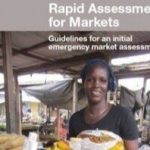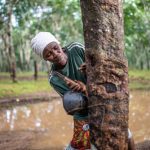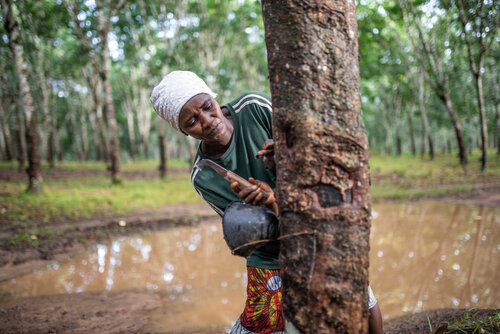
Improve Crisis Response by Understanding and Leveraging Markets – Tools
January 9, 2024
Women in Rubber: Hidden roles but visible value
January 9, 2024RSS: Rubber processing offers a pathway to profit for an ailing industry


It is several hours before sunrise at a rubber plantation in Margibi County. Michael Holder slices into the bark of a rubber tree with a small knife, releasing sap which dribbles into a cup positioned below. The plantation is silent apart from the crunch of dry leaves as Michael moves from tree to tree. He taps 500 trees for latex in this way every morning. A couple of hours later, he pours the contents of each cup into a bucket and takes it to a collection point to be weighed.
Despite Liberia’s favorable climate for rubber farming, life is not easy for tappers working in a sector that has been badly hit by a global slump in prices. Michael’s income is directly linked to the world market price. “If the price is high you can get something for yourself, but if it’s very low you get nothing much,” he explains. “If the price is high I make 100 dollars per month, sometimes 120, but at the moment it’s closer to 40 or 50 dollars.”
Liberia’s rubber sector is dominated by a small number of foreign concession companies, the largest being Firestone which operates one of the world’s biggest plantations. Firestone is also the country’s principal buyer of smallholder produce but only accepts “cup lump”. This is rubber in its most raw form made from latex mixed with formic acid to solidify it. “There’s no competition in a market where you only have one buyer, and no value addition,” laments Wilhemina Mulbah Siaway, President of the Rubber Planters’ Association of Liberia. “Firestone comes up with the price and farmers struggle to break even,” she adds.
But there is now an alternative to this arrangement.
WHAT IS RSS?
Ribbed Smoked Sheets (RSS) are a semi- processed rubber product most commonly produced in Southeast Asia, but now also in Liberia. Latex is collected from the farms and transported to a factory where chemicals are added before it is moulded into wet sheets. These sheets are then passed through a roller and cooked overnight in a smokehouse, turning them honey-colored and giving them a distinctive smoky smell.
RSS can be produced at a relatively low cost ready for export to manufacturers who turn it into finished goods such as tires and footwear. And the value addition is impressive. While farmers in Liberia are currently being offered 500 USD for a ton of cup lump, buyers in Thailand are paying over 1,700 USD for the same quantity of RSS.
WHY SHOULD INVESTORS CONSIDER RSS IN LIBERIA?
There is already one RSS processing unit up and running in Liberia, while other factories are under construction. The first factory, near Kakata in Margibi County, has partnered with the nearby Kwapaghei farmers’ cooperative to ensure a consistent supply of latex that is of adequate quality for RSS production. This requires the farms to be well maintained and free from undergrowth to mitigate the risk of latex contamination.
Farmers are willing to comply as the price they receive from the RSS processor is already five percent higher than what Firestone offers for cup lump. Harris Pemba is the head of Kwapaghei cooperative: “Since we are seeing the maximum profit through supplying the RSS industry there is no reason why we would go back to the old days of producing cup lump,” he says.
WHAT IS REQUIRED TO PROMOTE RSS PRODUCTION?
President Ellen Johnson Sirleaf’s government tried to encourage a shift in Liberia’s agricultural sector from subsistence farming to business. It considered RSS and other forms of agro- processing to be the key to sustainable growth. But the new government needs to do more to create a favorable investment climate to incentivize newcomers to the industry and create an easier path to export, as well as strengthening regulation and quality control.
The financial sector also needs to be strengthened to permit lending to support industrial growth. GROW has partnered with the Liberian Bank for Development and Investment to develop a loan product to enable new RSS processors to launch operations. However, although rubber is a primary agricultural interest, the fall in world prices combined with a severe problem of liquidity is affecting banks’ appetite to lend.
Yet for all of the challenges, Liberia’s fledging RSS industry presents high potential as an alternative market channel for smallholders, enabling them to add value to their produce prior to export. And with the right government support this new initiative could progress to a manufacturing industry in Liberia. Wilhemina Mulbah Siaway is optimistic: “Value addition is a win- win,” she says, “We’re selling rubber for 400 dollars but we’re still buying tyres for more money. If we can have a tyre manufacturer in Liberia that would be better than sending the raw product out.” The benefits should trickle down to tappers such as Michael Holder and ensure that he ceases to be short- changed by the market.
GROW Liberia © 2021 All rights reserved


